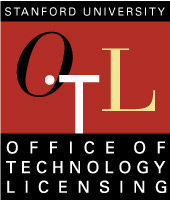On this page you will find information about Stanford policies on:
- Intellectual Property
- Licensing Faculty-Associated Companies
- Material Transfer Agreements
- Clinical Technology Assessment Agreements
- Guidelines for Use of Stanford Trademarks
- Export Control Memo from the Dean of Research
Intellectual Property:
Stanford's policies regarding intellectual property are contained in the
Research Policy Handbook.
Stanford is an ardent supporter of the licensing approach described in:
In the Public Interest: Nine Points to Consider in Licensing University Technology
top of page
Licensing Faculty-Associated Companies
OTL must be particularly sensitive to public perception when a potential
licensee is a faculty-associated company. While faculty-inventor input
is important in licensing decisions, OTL is aware of the faculty-inventor's
potential conflicts of interest and must negotiate from an "arms-length"
relationship. License agreements with faculty associated companies must
meet the highest standards with respect to financial terms and diligence
requirements to ensure that Stanford is justified in granting rights to
the technology.
- Faculty Policy on Conflict of Commitment and Interest
- Outside Consulting Activities by Members of the Academic Council
- Outside Consulting Activities by Members of the Academic Staff
- University Investments in Start-Up Companies Involving Stanford Faculty
top of page
Material Transfer Agreements (MTAs)
Incoming Material Transfer Agreements
Information about MTAs for materials being sent to Stanford from industry is available from the
Industrial Contracts Office.
Outgoing Material Transfer Agreements
Stanford and OTL have endorsed a policy regarding the distribution of tangible research materials. This policy encourages faculty and others to provide materials with no additional paperwork when they distribute materials as part of a sponsored research agreement or to their colleagues in academia and non-profit institutions.
If a Stanford researcher plans to send materials to an industry colleague, OTL can help provide either:
- An MTA that restricts use of the materials to research or evaluation purposes only. This document should be signed by an authorized official of the company and by OTL; or
- A license agreement for commercialization of the materials.
top of page
Clinical Technology Assessment Agreements
Under Clinical Technology Assessment Agreements (CTAA's), a company will provide experimental drugs to a researcher who administers the drug to patients under a specific protocol. The protocol must be approved by the Human Subjects Panel and, in most cases, the FDA. The CTAA is conducted for the purpose of generating data to evaluate the safety and efficacy of the drug. In most cases, the drug is patented by the company.
Contracts for these studies are handled by the Office of Sponsored Research in conjunction with the Research Management Group. For more information on Clinical Trials at Stanford, contact the The Stanford Center for Clinical and Translational Education and Research, Spectrum.
top of page
For information on Stanford's Trademark Licensing Program, please contact the Director of Business Development at: trademark@stanford.edu or call (650) 723-3331.
top of page
